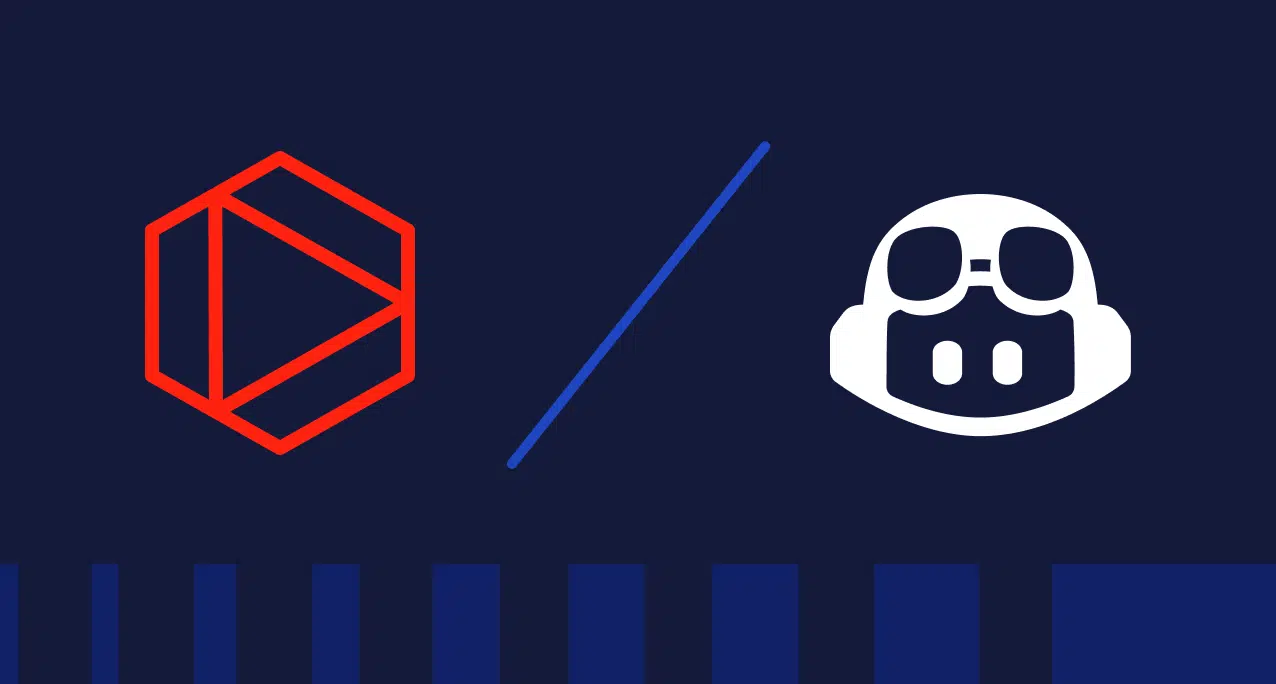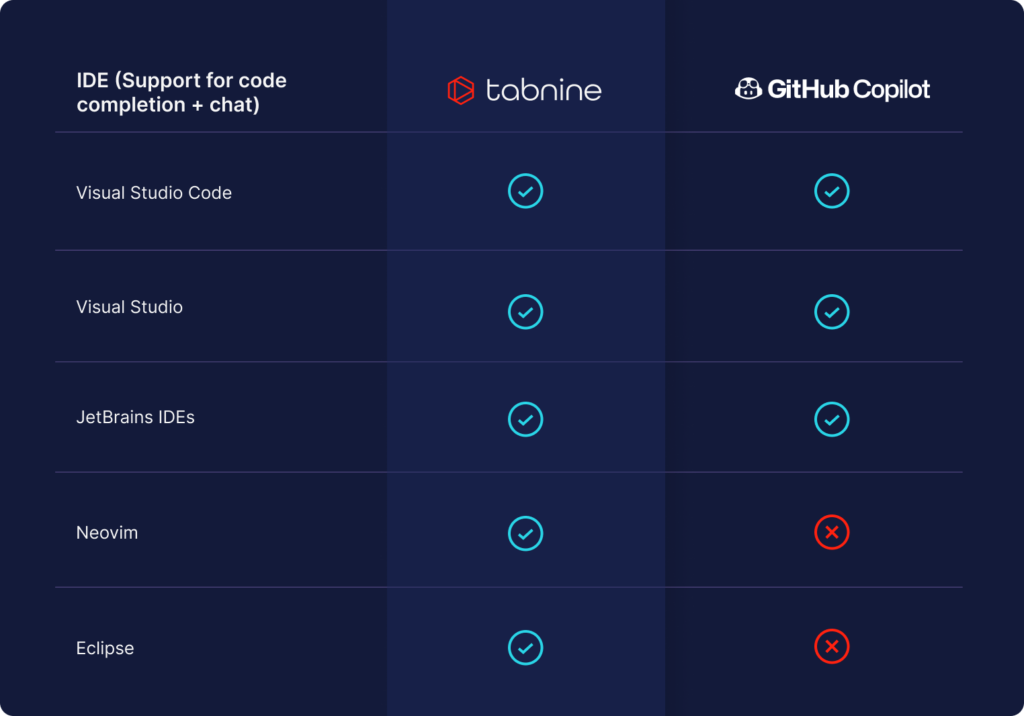Table of contents

Table of contents
Tabnine and GitHub Copilot are the leading AI code assistants on the market — each product has more than a million monthly active users and both products were recently featured as luminaries in Everest Group’s Innovation Watch Assessment for Generative AI Applications in Software Development.
What is Tabnine?
Tabnine is the AI code assistant that you control — helping development teams of every size use AI to accelerate and simplify the software development process without sacrificing privacy, security, or compliance. Tabnine boosts engineering velocity, code quality, and developer happiness by automating the coding workflow through AI tools customized to your team. Tabnine is trusted by more than 1,000,000 developers across thousands of organizations.
What is GitHub Copilot?
GitHub Copilot is an AI code assistant that helps you write code faster and with less effort, allowing you to focus more energy on problem solving and collaboration. It supports common programming languages like Python, JavaScript, TypeScript, Ruby, and Go and is integrated with VS Code, Jetbrains family of IDEs, Visual Studio.
Both Tabnine and GitHub Copilot offer AI-powered chat and code completions to accelerate the software development life cycle and support common use cases such as planning (i.e., asking general coding questions or better understanding code in an existing project), code generation, explaining code, creating tests, fixing code, creating documentation, and maintaining code. However, Tabnine offers significant advantages over GitHub Copilot, especially for developers, engineering leaders, and compliance and legal teams at enterprises that require a higher degree of control for critical elements in their AI assistants, beyond what a generic one-size-fits-all cloud service offers. Unlike GitHub Copilot, Tabnine gives you the utmost control over its AI code assistant by allowing customers to personalize the AI to their systems and set the privacy, and protection trade-offs that fit their security and compliance policies.
Privacy
IP protection
Tabnine eliminates worries about IP infringement by giving you the option to use license-compliant models. These license-compliant models can also be deployed in fully air-gapped environments.
Personalization
Tabnine delivers highly personalized recommendations — and you control what data Tabnine uses to add context from your environment.
Portability
This blog post goes through each of the differences between these products in detail, demonstrating why we believe that Tabnine is the ideal choice for enterprises and individual developers.
Even though generative AI for software development has become mainstream in the past few years, there’s still a lot of skepticism around code assistants. How does the AI code assistant handle my data? What data set is the underlying model trained on? Will my code be used to train the model? This skepticism has prevented companies from fully embracing AI for their engineering teams.
In this section, we’ll cover how Tabnine and GitHub Copilot address data privacy issues.
Data retention policies: GitHub Copilot retains your data. When accessing GitHub Copilot via sources other than in your IDE (such as CLI), your prompts and suggestions are retained for 28 days. This retention policy applies not only for Copilot’s Business tier but also for their Enterprise tier. GitHub Copilot does not use the data from the Business or Enterprise tiers to train its foundational model.
Tabnine takes a completely different approach and offers a zero data retention policy. When using Tabnine’s proprietary models, we don’t store customer code, don’t share customer code or usage data with third parties, and don’t use customer code to train our models.
Deployment options: GitHub Copilot is offered as a SaaS product and requires an active internet connection to facilitate the data transmission between IDE and Azure. This is often a deal breaker for privacy-conscious enterprises especially in highly regulated environments such as financial services, healthcare, defense, semiconductor, and automotive as these companies need an air-gapped deployment.
Tabnine offers its customers numerous deployment options. Customers can consume Tabnine as a secure SaaS offering (in a multitenant environment or a single-tenant environment) or do a fully private installation (on-premises or on VPC) to ensure that their code stays in the boundaries of their corporate network and isn’t shared with any external party.
Security and compliance: A SOC 2 compliance is a must-have for AI code assistants as it ensures that the product is taking proper security measures. GitHub Copilot is SOC 2 Type 1 compliant, but lacks the more critical SOC 2 Type 2 compliance. A SOC 2 Type 2 compliance examines how well the product’s security controls perform over a prolonged period of time, as compared to the Type 1 compliance that evaluates the security controls at a single point in time.
Tabnine offers key compliances like SOC 2 Type 2, GDPR, and ISO 9001 to ensure the security and privacy of your data.
The LLM that powers GitHub Copilot is trained on a broad collection of publicly accessible data (both code and general, and noncode data) which may include copyrighted material. If a code suggestion matches proprietary code, there’s risk that using that suggestion could trigger claims of copyright infringement. In fact, GitHub, along with Microsoft and OpenAI, are being sued for allegedly violating copyright law by reproducing open source code using AI.
GitHub Copilot offers an optional code-referencing filter to detect and suppress code suggestions (on average 150 characters in length) that match public code on GitHub. They also offer IP indemnification to protect their users from copyright issues and are previewing a new code-referencing feature to assist users in finding and reviewing potentially relevant open source licenses.
Tabnine eliminates concerns around IP infringement from the get-go. We’ve trained our proprietary models (Tabnine Protected for Chat, and the universal model for code completion) exclusively on permissively licensed code. This ensures that the recommendations from Tabnine never match any proprietary code and removes any concerns around legal risks associated with accepting the code suggestions. Unlike Github Copilot, we’re transparent about the data used to train our proprietary model and share it with customers under NDA. Additionally, we offer an IP indemnification to enterprise users for peace of mind.
In AI, context is everything. To increase the effectiveness of AI code assistants, it’s imperative to provide contextual awareness to the LLMs so that they can understand the subtle nuances that make a developer and organization unique.
GitHub Copilot gains the context by leveraging the locally available information in the developer’s IDE, and it can index an organization’s GitHub repos to gain the global context. Model fine-tuning is not currently available.
Tabnine leverages locally available data in the developer’s IDE to provide more accurate and relevant results. This includes runtime errors, imported libraries, other open files, current file, compile/syntax errors, noncode sources of information, current selected code, connected repositories, conversation history, Git history, project metadata, and other project files.
Additionally, users can connect Tabnine to their organization code repos to gain global context. Unlike Copilot, we’re vendor-agnostic and enable users to connect Tabnine to any Git-based repository (e.g., GitHub, GitLab, Bitbucket). Additionally Tabnine offers model customization: you can fine-tune our proprietary model using your own code to create a custom model. Model customization is extremely valuable when you have code in a bespoke programming language or a language that’s underrepresented in the training data set, such as System Verilog.
GitHub Copilot uses the GPT family of models to power its AI chat. Since the GPT family of models are the only model option, it prevents users from leveraging the new and powerful models that become available.
Tabnine currently offers users 8 different model choices for Tabnine Chat: two custom-built fully private models from Tabnine, plus Open AI’s GPT-4o, GPT-4.0 Turbo, GPT-3.5 Turbo, Anthropic’s Claude 3 Sonnet model, Cohere’s Command R model, and Codestral, Mistral’s first-ever code model. This flexibility enables users to pick the right model based on their use case or a project. For projects where data privacy and legal risks are less important, you can use a model optimized for performance over compliance. As you switch to working on projects that have stricter requirements for privacy and protection, you can change to a model like Tabnine Protected that’s built for that purpose.
Enterprises have complete control when selecting models that power Tabnine Chat. Tabnine admins can choose any specific models from the list of available LLMs and make them available to their teams. They can also connect Tabnine to an LLM endpoint inside their corporate network if needed.
Many new, powerful LLMs were released in the first half of 2024 alone: OpenAI’s GPT-4o, Anthropic’s Claude 3 models, and Cohere’s Command R+ model to name a few. At Tabnine, we’re committed to adding support for new, state-of-the-art LLMs as they become available. This prevents LLM lock in, future-proofs your AI strategy, and enables you to take advantage of all the innovation happening in this space.
Tabnine offers much more robust coverage for IDEs compared to Copilot.

Tabnine is significantly less expensive than Copilot. The table below lists the price per user per month.

The table below summarizes the differences between Tabnine and GitHub Copilot. Both products support common use cases such as code generation, creating documentation, generating tests, and more. However, if you need an AI code assistant that gives you complete control over data privacy, deployment options, personalization, protection from IP infringement issues, freedom to choose the right LLM for your use case, and wider IDE coverage, then you should consider Tabnine.

Tabnine is the originator of the AI code assistant category and we introduced our first AI-based code completion tool for Java in the IDE in June 2018. Tabnine is now the leading AI code assistant on the market with one million monthly active users. This enables us to gather feedback from a vast number of users and make continuous improvements and refinements to the product.
Tabnine is honored to be recognized in Gartner® Critical Capabilities for AI code assistants, which focused “on 14 critical capabilities that align with the five most common Use Cases in AI-augmented development.” Gartner® evaluated 12 vendors, and here’s how Tabnine ranked.
Tabnine is ranked first for:
Tabnine is ranked second for:
Omdia recognized Tabnine in Omdia’s Market Radar for AI-Assisted Software Development.
Tabnine’s position as a leader in this space was recently reinforced as we were featured as a luminary in Everest Group’s Innovation Watch Assessment for Generative AI Applications in Software Development. Everest Group — a world-renowned research firm that provides strategic insights on IT, business processes, and engineering services — assessed 14 leading providers of generative AI solutions for software development for this report. The assessment framework evaluated each provider on four criteria (Scale, Level of maturity, Partnerships, and Investments) and segmented them into four categories (Luminaries, Fast Followers, Influencers, and Seekers). Tabnine performed exceptionally well in the entire assessment framework and is recognized as a Luminary.

Check out our Docs or contact us to schedule a demo with a product expert. If you want to try it out for yourself today, sign up here to try it free for 90 days.